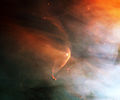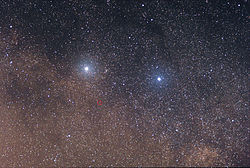R Muscae is a yellow-white hued variable star in the southern constellation of Musca. It has a nominal apparent visual magnitude of 6.31, which is near...
9 KB (691 words) - 19:51, 2 May 2025
Entomophthora muscae is a species of pathogenic fungus in the order Entomophthorales which causes a fatal disease in flies. It can cause epizootic outbreaks...
6 KB (656 words) - 17:31, 23 May 2024
Floater (redirect from Muscae volitantes)
shape, consistency, refractive index, and motility. They are also called muscae volitantes (Latin for 'flying flies'), or mouches volantes (from the same...
31 KB (3,414 words) - 12:14, 27 May 2025
Delta Muscae, Latinized from δ Muscae, often catalogued as HD 112985, is a spectroscopic binary star system and the closest to the Earth in the southern...
7 KB (574 words) - 05:35, 4 June 2025
Theta Muscae (θ Muscae) is a multiple star system in the southern constellation Musca ("the Fly"), containing a Wolf-Rayet star and two massive companions...
11 KB (1,021 words) - 03:54, 17 July 2024
Lambda Muscae, Latinized from λ Muscae, and often catalogued HD 102249 or HIP 57363, is a triple star system and the fourth-brightest star in the Southern...
8 KB (642 words) - 19:30, 28 May 2025
GT Muscae, also known as 12 Muscae, is a variable star about 400 light years from the Earth, in the constellation Musca. It is a 5th magnitude star, so...
13 KB (1,003 words) - 18:14, 23 May 2025
GRS 1124-683 (redirect from GU Muscae)
black hole candidate. The system also goes by the name X-ray Nova Muscae 1991 or GU Muscae. These two orbiting X-ray telescopes discovered the system when...
4 KB (476 words) - 22:54, 19 January 2025
Epsilon Muscae, Latinized as ε Muscae, is a red giant star of spectral type M5III in the constellation Musca. It is a 4th magnitude star, visible to the...
6 KB (472 words) - 18:52, 28 May 2025
Beta Muscae, Latinized from β Muscae, is a binary star in the southern circumpolar constellation of Musca. With a combined apparent visual magnitude of...
8 KB (645 words) - 18:30, 28 May 2025
An R Coronae Borealis variable (abbreviated RCB, R CrB) is an eruptive variable star that varies in luminosity in two modes, one low amplitude pulsation...
25 KB (2,015 words) - 06:17, 14 March 2025
Alpha Muscae, Latinized from α Muscae, is a star in the southern circumpolar constellation of Musca. With an apparent visual magnitude of +2.7, it is...
10 KB (766 words) - 18:28, 28 May 2025
dots. Scheerer's phenomenon can be easily distinguished from floaters (muscae volitantes). Scheerer's phenomenon consists of corpuscles of identical diameter...
7 KB (897 words) - 20:40, 18 November 2024
output is in the ultraviolet. The naked-eye star systems γ Velorum and θ Muscae both contain Wolf-Rayet stars, and two of the most massive known stars,...
97 KB (10,616 words) - 23:44, 4 June 2025
TU Muscae, also known as HD100213, is an eclipsing binary star in the constellation Musca. Its apparent magnitude ranges from 8.17 to 8.75 over around...
8 KB (663 words) - 15:38, 12 February 2025
GR Muscae, also known as 2S 1254-690 is a binary star system in the constellation Musca composed of a neutron star of between 1.2 and 1.8 times the mass...
4 KB (396 words) - 17:32, 28 May 2025
Entomophthora leyteensis Villac. & S. Keller ex S. Keller (2004) Entomophthora muscae (Cohn) Fresen. (1856) Entomophthora oehrensiana (Aruta, Carrillo & Monteal...
34 KB (3,807 words) - 23:51, 27 May 2025
Actually a three-star system Alpha1 and Alpha2 Capricorni Theta Muscae and Theta Muscae B Zeta1 and Zeta2 Scorpii Eta1 and Eta2 Coronae Australis Winnecke...
17 KB (1,864 words) - 16:50, 28 February 2025
Zeta2 Muscae, Latinized from ζ2 Muscae, is a star in the southern constellation of Musca. Its apparent magnitude is 5.16. This is a white main sequence...
7 KB (549 words) - 09:53, 22 August 2024
S Muscae is a classical (δ) Cepheid variable star in the constellation Musca about 2,600 light years away. S Muscae is a yellow supergiant ranging between...
8 KB (665 words) - 15:18, 25 December 2023
well understood. Some examples of entoptical effects include: Floaters or muscae volitantes are slowly drifting blobs of varying size, shape, and transparency...
12 KB (1,790 words) - 09:29, 7 April 2025
felis, S. delphini, S. hyicus, S. intermedius, S. lutrae, S. microti, S. muscae, S. pseudintermedius, S. rostri, S. schleiferi S. lugdunensis group – S...
28 KB (2,801 words) - 23:34, 10 June 2025
heliosphere. In 2006, a far infrared bow shock was detected near the AGB star R Hydrae. Bow shocks are also a common feature in Herbig Haro objects, in which...
18 KB (2,052 words) - 11:29, 25 March 2025
Eta Muscae is a multiple star system in the southern constellation of Musca. It is visible to the naked eye as a faint, blue-white hued point of light...
10 KB (677 words) - 19:04, 28 May 2025
for planets around Alpha Centauri A, as well as observations of Epsilon Muscae. The coronographic observations, which occurred on July 26 and 27, 2023...
121 KB (11,787 words) - 02:30, 12 June 2025
feed on housefly larvae in manure heaps and the predatory mite Macrocheles muscae domesticae consumes housefly eggs, each mite eating 20 eggs per day. Houseflies...
54 KB (6,346 words) - 21:05, 29 May 2025
SY Muscae is a binary star system in the constellation Musca composed of a red giant and a white dwarf. Its apparent magnitude varies from 10.2 to 12.7...
8 KB (620 words) - 00:28, 19 December 2024
point. The blue supergiant Theta Muscae has one of the lowest B−V indices at −0.41, while the red giant and carbon star R Leporis has one of the largest...
11 KB (1,037 words) - 10:56, 9 June 2025





















